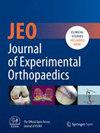This study aimed to compare the use of cortisone (C), intra-articular injected at the end of hip arthroscopy in patients with femoroacetabular impingement (FAI), to a new Class III medical device based on hydrolyzed collagen peptides ‘PEPTYS’ (P) and, to investigate potential associations among preoperative symptoms and hip function, outcomes after arthroscopic surgery and presence of inflammatory biomarkers in synovial fluids (SFs) at basal condition.
The two treatments were administrated to patients scheduled for arthroscopy with simple blind randomization sampling. Based on the sample size calculation, the number necessary to recruit was at least 20 patients for the C group and 20 for the P group. SFs, when available, were obtained by aspiration just prior to surgical intervention. At the baseline, osteoarthritis (OA) severity was assessed with a radiographic scoring system (Tönnis classification). Physical examination and clinical assessment using the Hip disability and Osteoarthritis Outcome Score (HOOS) and visual analogue scale (VAS) score for pain were performed at the time of surgery and at 1 and 6 months of follow-up. At the time of surgery, chondral (Outerbridge score) and labral pathology based on direct arthroscopic visualization were also evaluated.
Forty-seven FAI patients were enroled, with a median age of 35 years with a standard deviation (SD) of 10.6 and a body mass index of 24.3kg/m² with an SD of 4.5. 24 patients were treated with C and 23 with P. Both treatments did not show any statistically significant difference in hip function and pain. High expression of inflammatory molecules in SFs was correlated with the worst post-operative articular function.
Our study showed that the use of P was completely comparable to cortisone. Therefore, PEPTYS might be a valuable candidate to improve early recovery, in terms of pain and function, from arthroscopic FAI treatment.
Level III, comparative and randomized study.



